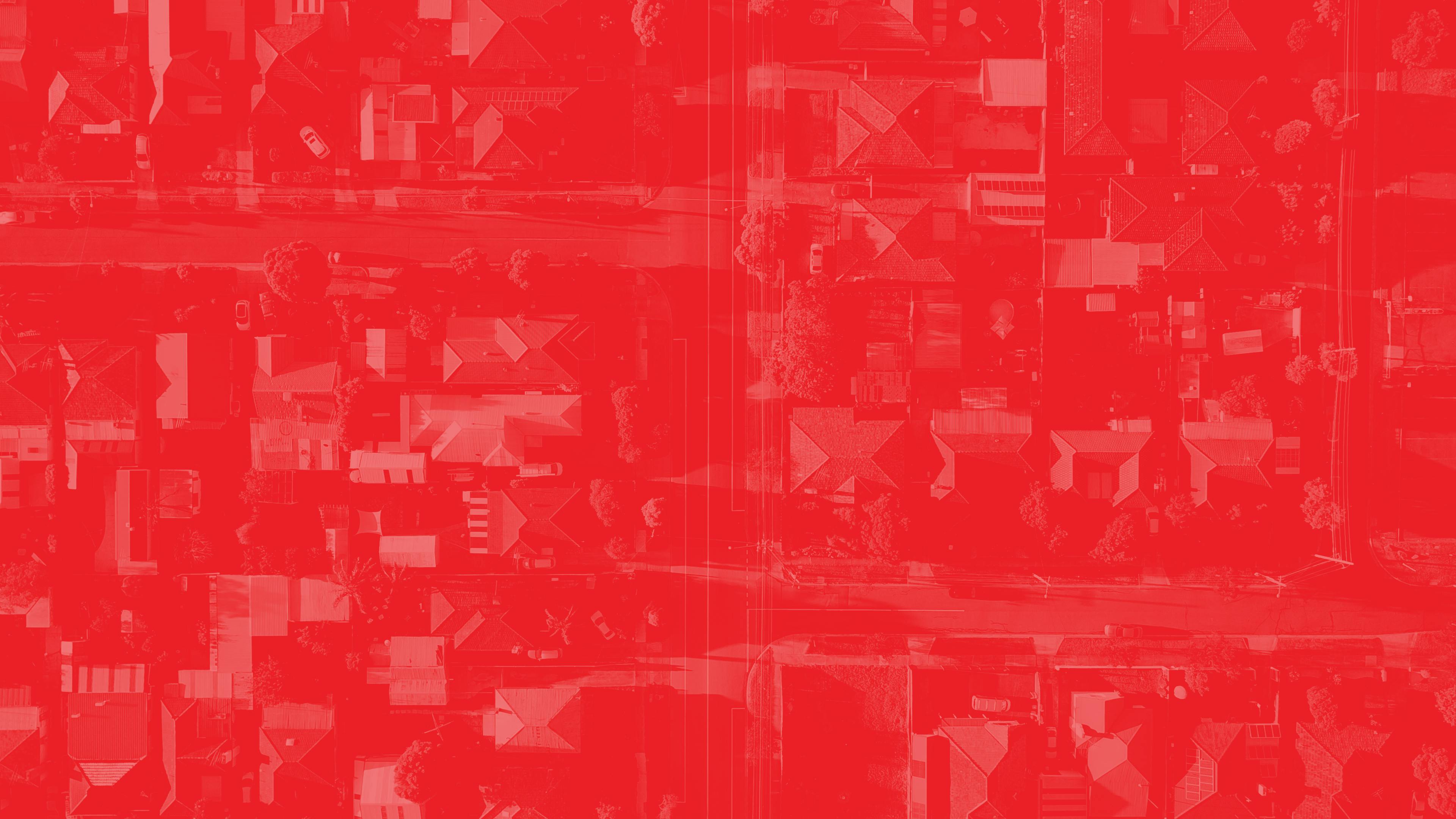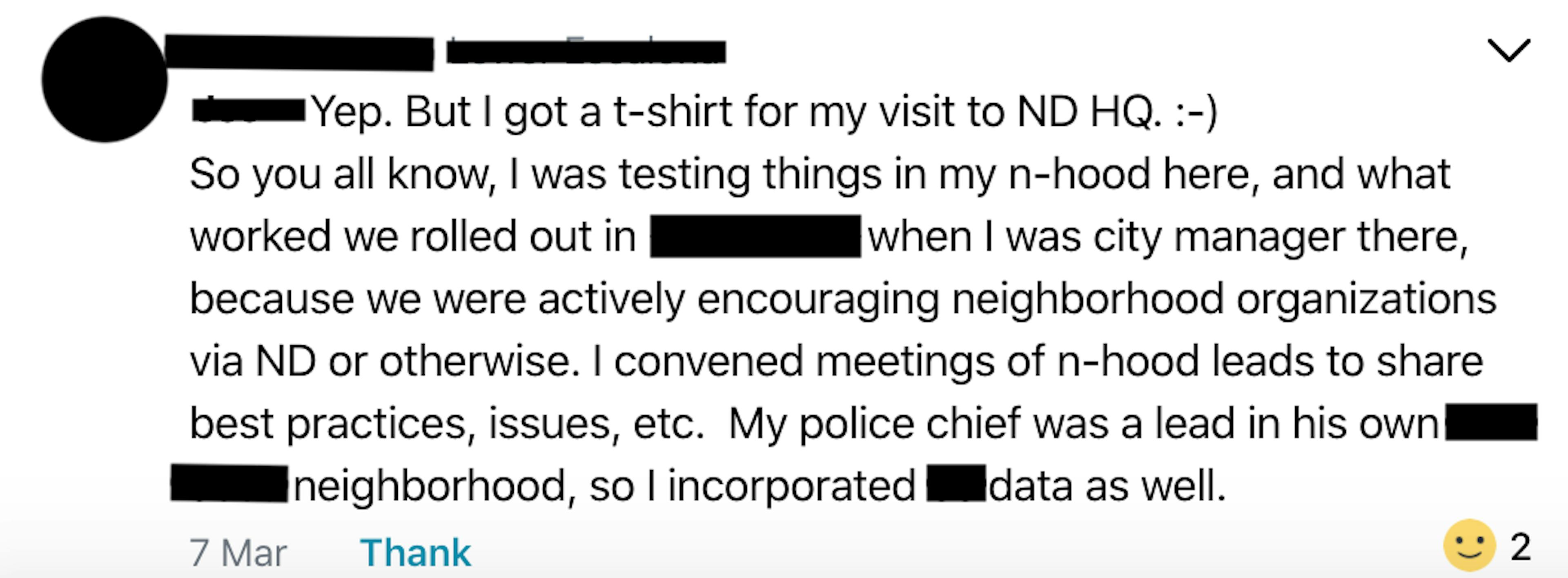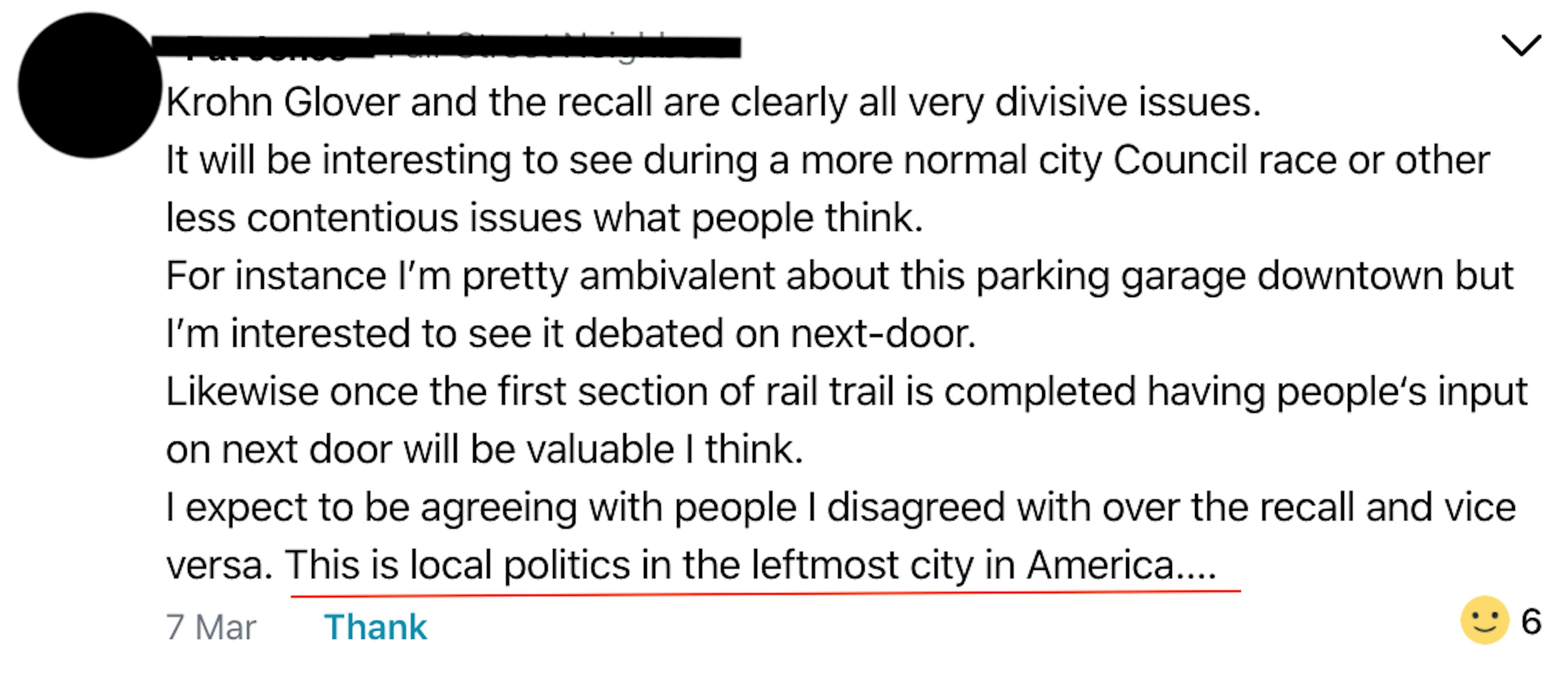
Nextdoor.com: Where Private Property Colonizes the Public Sphere
Days away from the 2020 election, Santa Cruz is in the throes of its campaign season. Signs for eager candidates adorn street corners all around the county. This year feels particularly strange, aside from being a global pandemic and the overwhelming hope to vote Donald Trump out of office is palpable, but also because city council campaigning has essentially been continuous since the last election in November 2018. Just two weeks before the Coronavirus Pandemic shuttered us into our homes, Santa Cruz residents voted by a slim majority to recall two city council members. The timeline of events has been disorienting and rapid, from the entire year of 2019 being devoted to recalling two council members (with large financial support provided by the real estate industry and property developers) to the 2020 primary where the two progressives were unfortunately unseated, followed by the still-ongoing global pandemic.
This November’s election will fill four vacancies on the Santa Cruz City Council (DSA’s endorsements can be found here). Campaign promises and slogans routinely emphasize ways to address the serious issues our community faces, with competing ideas about housing and affordability at the center. As we prepare for the election and analyze its aftermath, it’s important to unpack the details of how the potential for real political progress over the past two years has been thwarted not only by the recall campaign, but also by social media’s working to undo democratic process in our coastal city. Indeed, the “neighborhood social network” Nextdoor.com gave rise to the recall and powered it further. As such, it offers a distinct view into the intersections of fear-based social media and property interests within the context of platform capitalism.
Contextualizing the housing crisis: housing precarity alongside luxury developments
With the average cost of a home in Santa Cruz in the upwards of nearly $1M, and the median rent at $3,200, Santa Cruz ranks in the top five least-affordable cities in the nation. In a 60% majority renter city, over 70% of renters in Santa Cruz are rent burdened, meaning they pay over 30% of their income on rent. Rent Burden is one of four main signifiers of the current crisis conditions, with overcrowding, forced moves, and major problems from poor security to landlord neglect and in some cases, abuse.
According to the No Place Like Home Project, a UCSC/community-initiated, student-engaged assessment of Santa Cruz’ housing and affordability crisis, over 70% of unhoused people living on the streets were once residents in Santa Cruz County. Though there are many reasons behind the crisis, all exacerbated by the socio-economic impacts of COVID-19, NPLH helpfully explains the longstanding reasons as: (1) changing rental demand, owing partly to UCSC bringing undergraduate and graduate students alike to Santa Cruz and Silicon Valley tech workers seeking a coastal retreat (of which the remote conditions of COVID-19 are expected to accelerate); (2) inadequate supply of housing, with data showing skyrocketing rents and evictions even as tenant protections have continued to erode; and (3) political roadblocks that prevent or preclude bold approaches to combat the housing crisis, such as rent control and prioritizing affordable housing for moderate and low income residents.
One major contributor to the political roadblock that is of particular relevance here is Nextdoor. Indeed, it has had an immeasurable impact on the formation of public opinion, as the platform has increasingly asserted itself as a key online forum where local politics gets discussed. But it is far from neutral.
Recalling Nextdoor
The campaign to recall council members Chris Krohn and Drew Glover essentially began on Nextdoor, fueled by landlord and private property owner backlash to a prior rent control measure that deeply divided residents, defining the 2018 midterm election. While Measure M failed by a 60-40 margin, two Black progressive candidates, Drew Glover and Justin Cummings, were elected to city council at the same time. Their addition to the council boosted a 4-3 “progressive majority,” joining councilors Chris Krohn and Sandy Brown, previously elected in 2016 and halfway through their term. Conversations speculating on the grounds to recall elected officials began circulating on Next Door in January 2019, just days after the new councilors were sworn in.
By June 2019 an official recall effort was underway, funded by the same landlord / developer special interest lobbying groups that opposed Measure M (Santa Cruz United and Santa Cruz Together), animated by its newly appointed political enemy: Drew Glover. An angry landlord class essentially took umbrage with Glover’s bold support of social and economic justice initiatives, and he was quickly targeted as a bully, demeaning to women. Adding insult to injury, the opposition co-opted the #MeToo campaign’s approach to #believewomen, while conspicuously disavowing the anti-racist lessons of #BLM.
Chris Krohn’s recall, on the other hand, was purely strategic, especially considering his term would soon be up. Recalling Krohn for unfounded “bullying behavior”—amounting to allegations of minor workplace incivilities tinged with gender bias, which an independent investigation failed to substantiate—was to serve as a warning to other progressives. It also gave the impression that the anti-Glover accusations were not fundamentally racist at their core. The recall’s unfortunate outcome suggests that any perceived affront to liberal civility may be used effectively in the city council to repress substantial policy disagreements. As well, any questioning of the city’s financial elite will be met with the weaponization of identity politics set within well-funded smear campaigns to recall democratically elected representatives. In this campaign, Nextdoor was, and remains, integral.
Fear-based social media, surveillance capitalism, and racial profiling
Nextdoor has been a hotbed for racial stereotyping ever since it became popular and widespread. Since launching in the 2011, the platform has reportedly signed up over 10 million users across 220,000 US neighborhoods, according to a recent Vox article. As with Google, Facebook, Apple, Microsoft, Siemens, Uber, and Airbnb, corporations like Nextdoor are transforming themselves into platforms, providing the software and logistics for others to operate within their systems. According to its monopolistic co-opting of the market, platform capitalism exploits the free labor of users and renders paid labor precarious. It practices data mining and surveillance, and sells participants’ info to other corporations, the government, and the police. Indeed, an ongoing lawsuit against Nextdoor claims that because the platform shares information with law enforcement, it should be seen as a state actor.
As the self-proclaimed “neighborhood social network,” Nextdoor aims to bring neighbors together for the greater good of the community, often through discussions of everyday life (threads about lost cats, gardening tips, and home-improvement recs abound). But the fact remains, its community is exclusive and highly intolerant of neighbors who fall outside of mainstream liberal and conservative politics and its home-ownership base (74 percent of its members are homeowners). In fact, users commonly direct their collective venom at those who seem at odds with the forum’s reproduction of liberal and conservative “common sense.” Similar to other home-oriented apps and platforms, users’ accounts are tied to their address and neighborhood (the unhoused are thus automatically excluded). Users can post in their neighborhood forum or share on the city-wide general feed, while designated categories (businesses, real estate, local deals, etc.) and groups exist for specific topics of conversation.
Yet the platform also serves other functions. A 2019 Vox article nicknamed Nextdoor, along with related apps like Neighbors (Amazon’s attendant app to its Ring system of doorbell-equipped surveillance cameras), and Citizen (a crime-tracking app), as examples of “fear based social media.” As such, they tend to fuel a vicious cycle of fear, reinforce or encourage the desire for increased security and protection, and at best promote, and at worst condone online and real-life vigilantism.
The for-profit company has tried to be very explicit about what kind of content is allowed, with guidelines for how to “describe crime,” “communicate about crime,” and using Nextdoor as a crime prevention tool. Despite this, content moderation is almost completely subjective, as past studies and complaints confirm, and is determined by the platform’s “leads,” its member who are allowed to vote to remove posts that may violate Nextdoor guidelines (also reinforced by opaque algorithms). If content is flagged as harmful or offensive, leads basically vote on whether or not it violates community guidelines. That means content is only as offensive, false and misleading, or downright racist as its leads determine them to be.
It’s clear in reports (here and here) that a majority of leads were pro-Recall and frequently banned outright those who opposed it, constituting an egregious conflict of interest (as one lead explains: “pro-recall posts were ignored by leads 95% of the time, while anti-recall posts were reported and removed most often by leads themselves”). Even when racist and anti-homeless comments have been posted, they are still seen by potentially thousands of users before being deemed offensive and voting on removal. So moderation fails to prevent or stop racism or dehumanizing rhetoric as it’s happening.
In the notoriously white, “left most city” of Santa Cruz, fears of crime and the ambiguous “other” are not only racialized but also classed. As one of the least affordable cities with the highest rate of homelessness in the nation, Santa Cruz throws up serious economic barriers to “belonging.” Adding a further barrier online, Nextdoor sheds light on how the fear of crime, mixed with xenophobia, is intensified in relation to housing and the home, amplifying the values of what we can call “the real estate state.”
Nextdoor & The Real Estate State
“The real estate state” comes from Sam Stein’s coining and use of the term in his 2019 book Capital City: Gentrification and the Real Estate State. It defines a “political formation in which real estate capital has inordinate influence over the shape of our cities, the parameters of our politics, and the lives we lead” (5). Stein weaves these components together, making a compelling case about the frequent contradictions city planners encounter as cities “rebrand” (gentrify) according to the FIRE model (cities governed by Finance, Insurance, and Real Estate). Well-intentioned city planners and those elected officials who possess a critical approach to neoliberal market solutions often get caught in the crossfire, as many enter the profession for genuine altruistic reasons, and eventually learn they must answer to the “shareholders” of the city (or face a recall). Ultimately private property owners, local development coalitions, real estate brokers and developers, business associations, and their political affiliates rule.
Stein explains how the real estate state is a form of government, similar to the carceral, welfare, or administrative state, which is neither new nor all-encompassing. Housing as a commodity and a financial asset is precisely what has enabled landowners to determine the shape of cities for as long as private property has existed. What is new, however, is the scale of power real estate interests hold within the capitalist state. Real estate now comprises 60% of global assets, even as US homeownership rates have fallen to record lows. “As real estate values have risen to absurd heights, so has the political force of real estate capital,” (5). Here in Santa Cruz, as real estate prices have soared, so too has the political force of real estate capital, with Nextdoor acting as its handmaiden.
This political force is visible vis-à-vis neighborhood groups like Santa Cruz United, Santa Cruz Together, and Take Back Santa Cruz, which have led the charge in the recall campaign with large amounts of funding donated from corporate real estate and private property owners (including Seaside Co CEO Charles Canfield), as acknowledged openly in one Santa Cruz Nextdoor post from August 2019:
"Recall. Recall. If you think it takes too much time or money to recall Glover and Krohn, perhaps you should consider what the alternative is. This is not an issue that will go away. If you are happy watching your personal safety compromised and seeing nature consumed by needles and feces, then carry on. If you are thinking of moving, keep in mind the 12% transfer tax you would pay on your home. It’s not enough to simply sign the petition. We need more than that. We need more volunteers and money. Your home depends on it."
This post shows the effectiveness of fear based social media in conflating late capitalism’s material struggles with personal choice and responsibility, and posits a recall effort as the strategy to restore a nostalgic political future. In 2017, Nextdoor announced that it would add a whole real estate section to their platform in order to compete with Zillow. Real estate agents are now offered perks like free business pages and advertising specials, dramatizing the intersection of social media and the real estate state. Nextdoor wants to be the social network of choice for the Santa Cruz community, yet there are inherent mechanisms of exclusion baked into the platform.
Neighbors Who Don’t Belong: Media Apartheid?
Mechanisms of exclusion comprise the myriad implicit and explicit barriers of access to Nextdoor’s online community by way of the website’s account verification process, which mirrors the segregation of the real community by way of the high-priced housing market. For example, having an address is a prerequisite for a Nextdoor account. While this automatically excludes the unhoused (who are frequently seen as less than human within Nextdoor’s echo chamber), the prerequisite also poses serious issues in a majority renter city like Santa Cruz, with many residents experiencing chronic housing precarity. Being steps away from a late paycheck, experiencing an illness or car accident, places many outside the privileges of housing security assumed by Nextdoor.
Housing insecurity also means that people simply do not have the free time to spend on social media, because they’re juggling multiple jobs, or working on top of studying, trying to survive. Additionally, moving frequently makes Nextdoor membership nearly impossible, as neighborhood leads hold the “keys” to verifying addresses and unlocking the online neighborhood membership. Moderation decisions are generally made by people with implicit biases, as one user in Santa Cruz indicated in a post: “Who moderates fairness? The leads have a lot of power and they have their own biases. So my question is, how can Nextdoor be more democratic? CAN Nextdoor be more democratic?”
The moderation process is mired in ambiguity, and the question of who gets to decide what is fair (or which politics are acceptable) is far from transparent. It’s especially problematic when heated expression of opinions spills over into vitriol and hate. In these cases, leads vote on guidelines violations, and, as with the recall, it often comes down to moderators’ political views in determining whether and how content is removed or if a user has their account disabled (a familiar occurrence for many who express forms of dissent on the platform).
Leads aren’t appointed or elected. They are just the “first” to have accounts in their designated “neighborhood.” But how are those boundaries drawn? There’s much opacity that undermines confidence in the platform by users who would like to see it live up to the democratic ideals of social media’s oft-professed mandate in the first place, even while we know that such forums are for-profit private enterprises: a central contradiction of platform capitalism.
While many users on Nextdoor share a common goal of respectful debate, and broadly speaking, of building neighborly networks founded on genuine connection, this space for imagining collectivity in reality becomes a battleground to hash out antagonistic belonging. At its worst, it amplifies racial and class biases, sustaining tropes of authoritarianism upon which the suburban “media surround” thrives, as explained by theorist David Banks: “The modern suburb in America began as a means of providing abundant and comfortable housing to white Americans and has now evolved into a carefully tuned media surround—replete with ubiquitous screens running alarmist commercial media—that seeks to sustain that apartheid at any cost.”
Nextdoor too is defined by “ubiquitous screens running alarmist commercial media.” And it’s all highly addictive owing to automatized comment notifications. The platform thereby joins the exclusionary mechanisms of the real estate state to the authoritarian, suburban surround, expanding media apartheid wherever it exists, including in Santa Cruz (which is not exactly a suburb, but follows a similar political logic). Indeed, Nextdoor too functions as “a refined sorting device designed to isolate and segregate people, demonizing outsiders and terrorizing residents with a racialized fear of ‘intruders’ and of general difference, investing the tendency to conform with a political urgency. The poor, precisely because they lack the material means of navigating [this space], are portrayed in the media as either a threat or an impediment to the middle class’s well-being.”
Such is a perfect description of one of Nextdoor’s key functions in Santa Cruz: to channel the social-media manufacturing of collective fear toward “tough on crime” arguments that support policing. As in the case of the recall, Nextdoor operates as the online vehicle driving the city’s reactionary political formation (if by a hyper-vocal set of minority users) toward instrumentalized political results, as revealed by one user:

“Let’s take back our beautiful town” rings familiar as a bumper sticker for any number of “tough on crime” political formations in Santa Cruz. But it’s not hard to decipher that this understanding of Santa Cruz’s “beautiful town” is ultimately founded on security, gentrification, and policing, all of which reflects the propertied class’s elite values that appear to be those of many of Nextdoor’s users. A post from March of this year explains how one Santa Cruz resident installed a tracking code on their personal Nextdoor account, and utilized this data to inform policy in a neighboring city in the Santa Cruz Mountains where they worked as the City Manager and the police chief was a Nextdoor lead.

Similar to Amazon Ring and its app counterpart, Neighbors, Nextdoor encourages local police departments to tap into its data directly. Likewise, people on the platform employ features that make reporting to police much simpler. For example, Nextdoor rolled out a “Forward to police” button in 2016. The company’s CEO Sarah Friar explained in a recent article that it wasn’t until the recent Black Lives Matter uprisings that she began to rethink the harm a feature like this could have, abetting many platform users’ penchant for toxic bullying. It’s clear it contributes to and furthers the ends of a criminal (in)justice system rooted in racial profiling, and reveals how many tech platforms overlook their own complicity in propping up the surveillance police state. That Nextdoor may be utilized as a tool of “crime prevention” on one hand and a means to build community on the other, reveals a set of contradictions about the platform's purpose that ultimately marks users.
In a post from August 2019, “What is Nextdoor for?” a neighborhood lead seeks input from users and other leads to develop a shared/ consistent practice of content moderation. “Whatever we permit for a poster we agree with should be permitted for one we don’t. Next Door is our only democratic forum, and it should be available for discussion of large issues, in my opinion...” The simple solution of users agreeing to a shared practice is not just an effect of platform capitalism, but an explicit function, where responsibility is placed onto users rather than the platform's architects. As if Nextdoor or social media platforms as a whole could be anything other than tools of the surveillance state if only users would agree to be nicer to one another. Indeed, “kindness” is at the center of Friar’s supposed vision for the platform’s future, with features like the “Help Map” and the “kindness reminder” rolling out during the pandemic. Just as calls to defund police reject reformism (insofar as an institution rooted in centuries of racism, oppression and domination cannot be reformed), the same can be said for social media rooted in the tech industry’s ruthless pursuit of profit.
Politics in the Left Most City of the Real Estate State

Nextdoor is a formative place for discussions of the future of our city, and as a tool to advance certain political outcomes. As such, it co-opts not only the erstwhile radical potential of social-media movements, but also the democratic public sphere itself, in pursuing an agenda that’s heavily entrenched in the capitalist interests of private property and the policing of those interests. The depths of its power exist in emotional and affective attachments to homes and neighborhoods, as Nextdoor plays off the deepest, most intimate aspects of our lived experience. The platform uses these emotional attachments to build membership and its advertising base, exploiting a basic human need for connection and belonging—that is, even as it manipulates neighbors into building a panopticon for surveillance capitalism. Nextdoor highlights these tensions and reveals the political force of real estate capital in shaping the contours of our city, the parameters of our politics, and the lives we lead.
From Social Media to Socialist Media!
What would it mean to transform this privatized public space of social media from a model of platform capitalism and the real estate state—dedicated to wealth accumulation, gentrification, policing, premised on social ostracism, as glimpsed in recent films like The Social Dilemma, despite its liberal inadequacies—into something egalitarian, democratic, and inclusive? How might we reimagine social media as socialist media? How might communities reclaim technology for a future beyond capitalism? Just as some see in Amazon, Google, and Walmart the logistics and computer technology that might otherwise serve the many instead of exploiting them for the profits of the few, we no doubt need a collective forum free of capitalism’s ideological pressures. Indeed, collectivizing social media via public take-over or even through eminent domain, or inventing our own, offer options for moving forward. If we are to advance the goals of a multiracial working-class reimagining of politics and society, then a democratic socialist media has an important role to play.

The Karen to Cop Pipeline: Who are the Volunteer Cops and why are they targeting certain people with parking violation tickets?
Continue Readingarrow_right_alt
The Karen to Cop Pipeline: Who are the Volunteer Cops and why are they targeting certain people with parking violation tickets?
Continue Readingarrow_right_alt